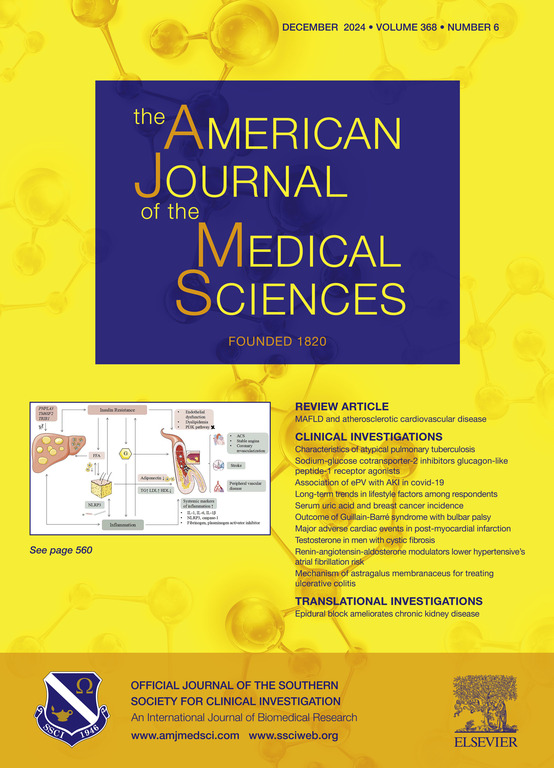睾酮缺乏及治疗对男性心脏代谢综合征的影响。
IF 1.8
4区 医学
Q2 MEDICINE, GENERAL & INTERNAL
引用次数: 0
摘要
背景:睾酮(T)是一种代谢、性和血管激素,在许多组织和器官中具有重要的代谢功能,在维持人体生理和健康方面起着关键作用。缺乏睾酮对男性健康有不利影响,并对生活质量产生负面影响。T调节肌肉组织的分化、生长和功能,抑制脂肪细胞分化和脂肪积累;因此,它调节身体成分。因此,T缺乏(TD)可能导致肥胖和代谢综合征(MetS)的发展。值得注意的是,在过去的80年中,只有4个随机临床试验的报道,持续时间为3年或更长。因此,了解长期T治疗(TTh)对MetS及其组成部分的改善作用将主要来自观察性和登记性研究。方法:以“代谢综合征”为关键词,利用NCBI文库和PubMed对现有文献进行综合综述;睾丸素不足;睾丸激素疗法”。本文检索了相关文献,总结了TD、TTh和MetS之间的潜在关系。结果:当代医学文献的研究结果强烈表明,TD是MetS发病的一个预测因子,而th可以改善MetS的成分。几项关于TTh对TD患者met影响的注册研究的长期数据明确表明,长期TTh(长达11年)导致腰围(WC)、空腹血糖、甘油三酯(tg)、收缩压和舒张压降低,高密度脂蛋白胆固醇(HDL)升高。综上所述,长期服用TTh对TD患者:1)产生显著且持续的体重减轻;2)防止糖尿病前期发展为2型糖尿病;3)可能导致2型糖尿病的缓解;4)降低空腹血糖;5)减少心血管事件和死亡率。结论:在这篇叙述性综述中,我们总结了现有的关于TD与MetS发展之间潜在关系的当代文献,并讨论了长期TTh对改善男性MetS成分的发现。本文章由计算机程序翻译,如有差异,请以英文原文为准。
Effects of testosterone deficiency and therapy on the cardiometabolic syndrome in men
Background
Testosterone (T) is a metabolic, sexual, and vascular hormone that has an important metabolic function in many tissues and organs and plays a key role in maintaining human physiology and health. A deficiency of T has detrimental effects on men’s health and negatively impacts quality of life. T regulates differentiation, growth and function of muscle tissue and inhibits differentiation into adipocytes and fat accumulation; therefore, it regulates body composition. Thus, T deficiency (TD) may contribute to development of adiposity and metabolic syndrome (MetS). It should be noted that over the past 80 years, only 4 randomized clinical trials with a duration of three years or longer were reported. Hence, understanding the effects of long-term T therapy (TTh) on amelioration of MetS and its components would be attained mostly from observational and registry studies.
Methods
A comprehensive review of the current literature utilizing the NCBI library and PubMed were utilized using the key words “metabolic syndrome; testosterone deficiency; testosterone therapy”. Relevant articles were retrieved and a summary of the potential relationship between TD and TTh and MetS were synthesized.
Results
The contemporary findings in the medical literature strongly suggest that TD is a predictor of onset of MetS and TTh ameliorates MetS components. Long-term data from several registry studies on the impact of TTh on MetS in men with TD demonstrated unequivocally that long-term TTh (up to 11 years) resulted in reductions in waist circumference (WC), fasting blood glucose, triglycerides (TGs), systolic and diastolic blood pressure and increased high-density lipoprotein cholesterol (HDL). In summary, long-term TTh in men with TD: 1) produces substantial and sustained weight loss; 2) prevents the progression from prediabetes to type 2 diabetes; 3) may result in remission of type 2 diabetes; 4) reduces fasting blood glucose; and 5) reduces cardiovascular events and mortality.
Conclusions
In this narrative review, we summarize the available contemporary literature on the potential relationship between TD and development of MetS and discuss the findings of long-term TTh on amelioration of MetS components in men.
求助全文
通过发布文献求助,成功后即可免费获取论文全文。
去求助
来源期刊
CiteScore
4.40
自引率
0.00%
发文量
303
审稿时长
1.5 months
期刊介绍:
The American Journal of The Medical Sciences (AJMS), founded in 1820, is the 2nd oldest medical journal in the United States. The AJMS is the official journal of the Southern Society for Clinical Investigation (SSCI). The SSCI is dedicated to the advancement of medical research and the exchange of knowledge, information and ideas. Its members are committed to mentoring future generations of medical investigators and promoting careers in academic medicine. The AJMS publishes, on a monthly basis, peer-reviewed articles in the field of internal medicine and its subspecialties, which include:
Original clinical and basic science investigations
Review articles
Online Images in the Medical Sciences
Special Features Include:
Patient-Centered Focused Reviews
History of Medicine
The Science of Medical Education.

 求助内容:
求助内容: 应助结果提醒方式:
应助结果提醒方式:


